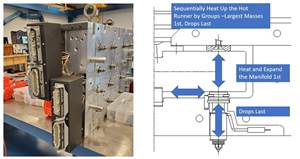More Related Technical Instruction Justification
Finding, Training & Retaining Employees, Part 8
In the previous two articles, we summarized some common Related Technical Instruction (RTI) that can be used for an apprenticeship program. In this installment, we will make some final recommendations as to what may be good courses for apprenticeship RTI.
CNC Classes. All apprenticeship programs in moldmaking should include CNC machining. All personnel need at least a “100-level,” basic course, and it is recommended that moldmaker apprentices take up to at least 200-level CNC classes. Whether a person is going to be running a CNC or not, he or she must possess a certain CNC competency level, at least for the sake of interdepartmental communications. It is important that a moldmaker not only understand the basics of G code and the Cartesian Coordinate System, but also some of the design configurations and capabilities of various styles of CNC machines.
If the apprentice is specifically a CNC machinist apprentice, s/he needs to complete the entire series of courses—from CNC basics to machining process development, fixturing and programming strategy. The program’s goal is that s/he is able to speak competently with all CNC supplier representatives and provide intelligent input into process improvements.
Moldmaking Classes. It is also recommended that everyone achieve some level of formal moldmaking instruction. CNC machinists should reach at least as high as a 200-level class. They need to comprehend what a part is and how it mates or interacts with other components of the mold. This is necessary to determine surface finish and to understand part tolerances. This level of knowledge can dramatically impact machining efficiency and strategy. Naturally, if an apprentice is working as a moldmaker, designer or engineer, s/he should have as much formal schooling in plastic mold design as possible.
Personal Development/Life Skills. Life skills is one category of skill deficit that comes to the forefront of every shop discussion around apprentices. Today’s generation often lacks sufficient understanding of an employer’s expectations in regards to personal accountability, work ethic, dependability, maturity and teamwork. To take this problem head-on, enroll new employees in communication, leadership and basic financial management classes. A popular course is “Shop Floor Culture & Expectations,” which covers these topics.
These classes serve as recommendations for you when designing the RTI for your apprenticeship program. The key is to create a program that is challenging, fun and rewarding for everyone. Train your employees with this end in mind: making them the best employee possible.
Related Content
Making Quick and Easy Kaizen Work for Your Shop
Within each person is unlimited creative potential to improve shop operations.
Read MoreHands-on Workshop Teaches Mold Maintenance Process
Intensive workshop teaches the process of mold maintenance to help put an end to the firefighting culture of many toolrooms.
Read MoreRevisiting Some Hot Runner Fundamentals
What exactly does a hot runner do? If you’ve been in the injection molding industry for any length of time, you might think the answer is obvious, but it is not.
Read MoreThe Ins and Outs of Hot Runner Temperature Control
A training checklist that explains the why and how of proper hot runner temperature control and system management.
Read MoreRead Next
Finding, Training & Retaining Employees
In this multi-part series of articles, contributor Ryan Pohl, a journeyman CNC machinist who also holds a master's degree in industrial training and development, addresses the skilled-labor shortage and its potential to dramatically hinder the future sustainability and growth of the moldmaking industry.
Read MoreAre You a Moldmaker Considering 3D Printing? Consider the 3D Printing Workshop at NPE2024
Presentations will cover 3D printing for mold tooling, material innovation, product development, bridge production and full-scale, high-volume additive manufacturing.
Read MoreReasons to Use Fiber Lasers for Mold Cleaning
Fiber lasers offer a simplicity, speed, control and portability, minimizing mold cleaning risks.
Read More








.jpg;maxWidth=300;quality=90)












